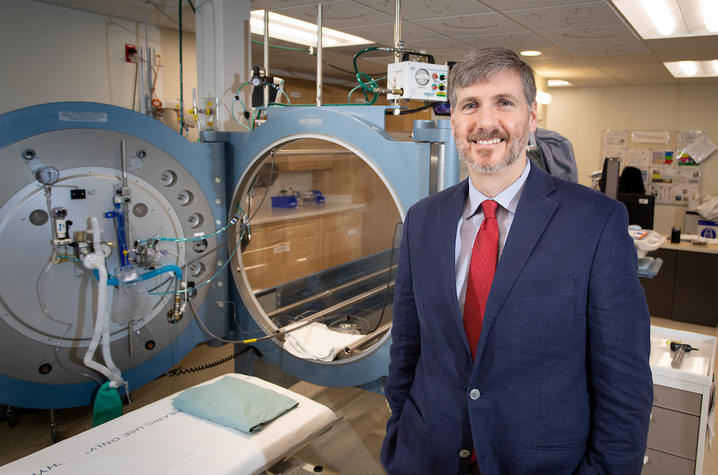Experimental Treatment Shows Promise in Treating Traumatic Brain Injury
LEXINGTON, Ky. (March 1, 2021) — The University of Kentucky Department of Emergency Medicine, in collaboration with the University of Kentucky Departments of Neurosurgery and Anesthesiology, is part of a national research study to determine if high-dose oxygen given under pressure (hyperbaric oxygen) will improve recovery following very severe traumatic brain injuries (TBI).
TBIs are life-threatening. They contribute to a substantial number of deaths as well as cases of permanent disability and lasting neurological deficits. Caused by a bump, blow or jolt to the head that disrupts the normal function of the brain, TBIs require immediate intervention.
Currently, there are no FDA-approved treatments for TBI. Hyperbaric oxygen treatment (HBO) is a treatment that is now being experimentally studied in adult patients with severe TBI. Hyperbaric oxygen treatment is a specialized way, using a pressure chamber, to dramatically increase the amount of oxygen delivered to body tissues. HBO is already being used to treat patients with chronic non-healing wounds and scuba divers as the very high levels of oxygen help speed the healing processes. In pre-clinical studies of patients with TBI, hyperbaric oxygen treatment has also been shown to increase oxygen delivery to the traumatized brain, preventing further cell death in the injured brain.
While it is experimental, Dr. Kevin Hatton, chief of the Division of Anesthesiology Critical Care Medicine at UK HealthCare, said the therapy shows significant promise.
“The key is treating patients quickly,” Hatton said. “As soon as a patient with severe TBI hits our emergency department, we want to administer this type of treatment.” Due to the fast-paced nature of emergency treatment, however, some patients will be enrolled in this study without consent if a family member or representative is not rapidly available. All patients will receive standard care for their TBI.
Learn more about HBO2 treatment or how to opt-out.
